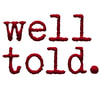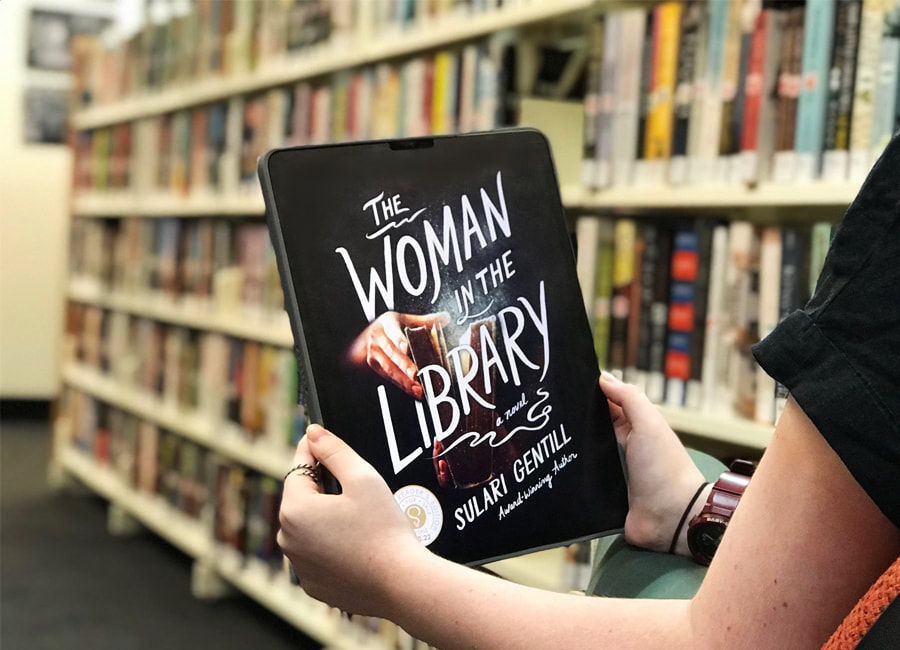Published by Ultimo Press, June 2022 | Fiction, Thriller, Australian author Sulari Gentill sure knows how to put merriment into murder mystery.
From the moment the action kicks off in The Woman in the Library when a scream pierces the rarified air of the Boston Public Library, through its myriad twists as the crime is solved, there is a buoyancy to Gentill’s prose that keeps the mood light and pace steady. The novel’s main delight is in the Agatha Christie-esque ‘whodunnit’ set up that brings together a group of strangers with a common interest in exposing the murderous culprit, each one in turn becoming a possible suspect. But Gentill has thrown in some extra sweet layers, with a secondary thoroughly entertaining narrative that creates a story within the story, through which she explores the art of writing itself. This quite unique structure is worthy of a little more explanation. The novel opens with an email beginning, “Dear Hannah”. It transpires the chit-chatty message is to fictional Australian author Hannah Tigone from one of her US fans, an aspiring writer called Leo. It seems Leo is a bit of a muse for Hannah. As she writes her new US-based novel, she sends Leo each progressive chapter, and he returns his feedback by email – whether that may be to offer a US correction to her Australianisms, a critique of her characters or a promise to scout location details. This back and forth sets the structure of the novel: we read a chapter of Hannah’s book (the murder mystery that unfolds), and each chapter is followed by an email with feedback from Leo to Hannah. It’s initially brilliant to see the way Hannah reflects Leo’s comments in each successive chapter. (Indeed, much to his delight, she even writes him in as a bit part within the storyline.) But as the novel progresses, Leo’s meta commentary becomes increasingly disturbing, taking this sub-story in a deliciously sinister direction. Meanwhile, the unfolding chapters of Hannah’s novel provide a thoroughly engrossing main story, through which the lines between imagination and reality become ever more blurred. Hannah’s narrator is (like her) a fictional Australian novelist, who she’s named Winifred (“Freddie”) Kincaid. Living in Boston after winning a scholarship to write her second novel, we meet Freddie as she spends her day at the Boston Public Library waiting for inspiration to strike. Through her inner monologue we hear her surreptitiously assessing the three strangers sitting near her, noting their traits with a view to incorporating them as characters in her novel. Her musings are suddenly interrupted by a woman’s scream, shocking her and her literary neighbours into conversation. The four strike up a quick bond, united by the trauma of the scream and this evolves into a common quest to solve the mystery. Enticingly, at the end of the first chapter, as the four make a decision to grab a coffee together, Freddie makes an ominous revelation: And so we go to found a friendship, and I have my first coffee with a killer. From that first spark of intrigue, we remain in lock-step with Freddie as her relationships deepen with her three new friends – somewhat strikingly named Cain McLeod, Marigold Anastas and Whit Metters – and the mysteries surrounding each character intensifies. The way Gentill has combined these two narratives – on the one hand the murder mystery, and the fan’s correspondence on the other – provides a unique and thoroughly entertaining reading experience. Even the farfetched nature of the plot was endearing, especially the quirky little asides, such as Freddie’s elderly neighbour who fabricated her medical qualifications before stitching up a gash to Cain’s head. Gentill even manages to squeeze in commentary on racism and social inequity. Above all I appreciated the aspects of Gentill’s approach that were akin to a master class in novel writing, which flowed through in different forms throughout the novel. For example, not only do we see the way Hannah responds to Leo’s critique in subsequent chapters of the novel, we are also given insights into Freddie’s writing process and how she absorbs her surroundings with the eye of a novelist. Indeed, a motif throughout is Freddie’s analogy of her process as like “working on a bus”: I’m not totally without direction…there is a route of some sort, but who hops on and who gets off is determined by a balance of habit and timing and random chance. There’s no symmetry, no plan, just the chaotic, unplotted bustle of human life. While this is my first Sulari Gentill novel, the Australian author – who lives in the small country town of Batlow near the Snowy Mountains and grows French black truffles – has many award-winning titles to her name. These include a long running series of historical crime novels, set in the 1930s, featuring amateur detective Rowland Sinclair, the latest published in January 2022, a fantasy adventure series The Hero Trilogy and a standalone novel After She Wrote Him. After reading The Woman in the Library, I can’t wait to pick up another. Comments are closed.
|
Categories
All
Archives
May 2024
|

